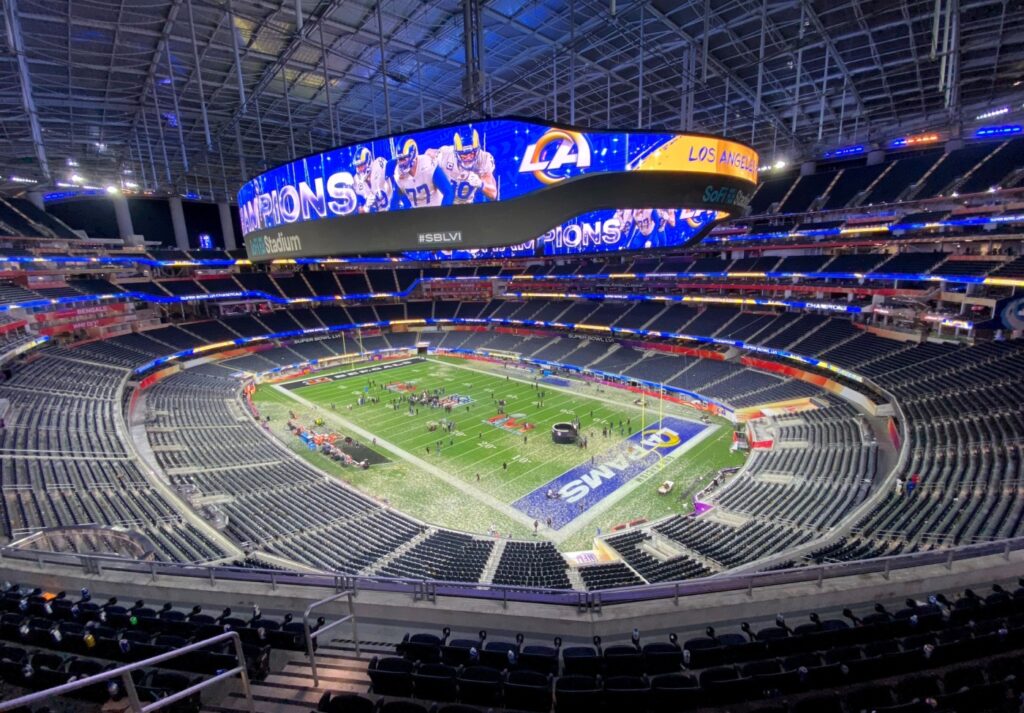
From a Southern California sports fan’s perspective, this year’s Super Bowl was as spectacular as it gets. The Los Angeles Rams pulled off a victory in an edge-of-the-seat thriller, following a tremendous string of playoff games. The Rams were only the second team to win in their home stadium. And the energetic halftime show featured a host of Los Angeles luminaries.
We’re equally impressed, however, by the setting – at newly built SoFi Stadium, the modernistic venue built at the site of the old Hollywood Park Racetrack. We’re wowed not just by the facility’s appropriately Southern California glitz and by the impressive array of adjacent developments, but by the way that Rams owner Stan Kroenke financed the project.
Aside from a less-than-ideal infrastructure-related tax incentive, Kroenke built the $5-billion stadium — the costliest in NFL history — on his own dime. “SoFi Stadium might be one of the most important stadiums in American history — a venue that points toward a future where billionaires who love sports, rather than taxpayers, serve as patrons of professional athletics rather than rent-seekers,” wrote Reason’s Eric Boehm.
Let’s hope he’s right. Most professional sports team owners exploit civic pride — and fear of relocating a beloved sports franchise to another city — to convince local governments to open up the treasury. Boehm understandably is upset at the ongoing bidding war between Maryland, Washington, D.C. and Virginia to house the renamed Washington Commanders football team.
That’s how these deals typically play out. These editorial pages have detailed the seedy deal-making by Anaheim officials to sell, at a discount price, the city-owned Anaheim stadium and 150-acre surrounding property to an investment group controlled by the Angels’ owner. That transaction is tied up in a lawsuit alleging that city officials violated the state’s open meetings law in doing so.
Cities shouldn’t own stadiums, nor should they provide massive tax funding. Subsidies often fail to keep teams from moving, typically due to the poor negotiating skills of local elected officials. According to a recent report in the San Jose Mercury News, the city of Oakland and Alameda County provided the NFL’s Raiders with a $189-million subsidy to keep the team in Oakland, but they left for Las Vegas, anyway.
Practically speaking, sports stadiums and arenas serve as poor investments for taxpayers. “They sit empty and useless most of the time, coming to life for a few hours on game day and then going dark and silent again. This makes them virtually worthless from the standpoint of economic development or job creation,” explained the Center for Economic Accountability.
Economists have studied the value of stadium subsidies for decades, and are nearly unanimous in their view that sports teams don’t expand the economic pie. Team owners’ promises of an economic windfall usually are smoke and mirrors. They merely shift limited entertainment dollars from other consumer choices (restaurants, concerts, vacations) to sport franchises.
Philosophically speaking, there’s no reason that the government should fund sports teams. These are highly profitable private businesses and they provide no essential services. Such subsidies deplete limited budgets and provide pressure for tax increases.
Furthermore, the SoFi Stadium deal proves that these subsidies aren’t even necessary. We cheered for the Rams, but are cheering even more at the prospect that other teams will follow their stadium-building approach.
